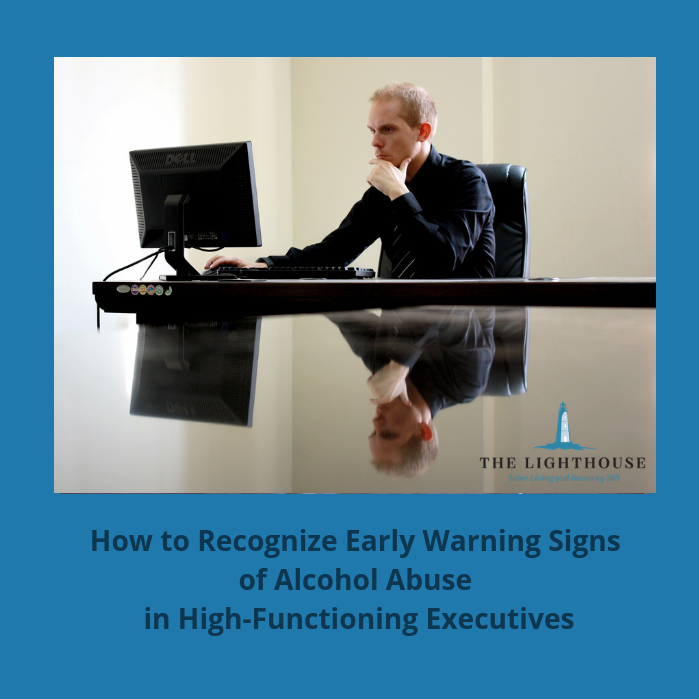How to Recognize Early Warning Signs of Alcohol Abuse In High-Functioning Executives
Do you think you are drinking too frequently or having more drinks than intended?
At one time, having several drinks throughout the day was commonplace to relieve stress, unwind, and steady the nerves before a board meeting.
You feel you might be developing a problem with alcohol, but you easily dispute the thought because you are still high-functioning. You get your work done. Most of all, you don’t look like the bums on Bowery begging for spare change, needing to change their clothes and drinking out of a brown paper bag.
Have you heard the phrase addiction doesn’t discriminate?
Research from The National Institute on Health concludes that “nearly 20 percent of alcoholics are highly functional and well-educated with good incomes.”
A high-functioning alcoholic will appear:
-
To have everything in life together
-
Have better and more stable relationships than other classes of alcoholics
-
Binge drink every other day
What this means is even though you don’t fit into the stereotypical category-defining your image of an alcoholic, if you feel your drinking is becoming dangerous to your health, seek the help and advice of a qualified professional.
It can be challenging to take a personal look at your hectic lifestyle, especially when you manage to get through a hectic workday. Juggling a jammed schedule, round the clock meetings with other executives, board meetings, and leading your team of employees, creates a high-level of stress.
You make it to the office each day, complete horrifying to-do lists, overbooked meeting schedules, corporate lunches, dinners, and events, and unexpected stressful situations.
As your career progresses forward, drinking becomes commonplace, more frequent, and acceptable behavior.
It’s difficult to admit your drinking is reaching dangerous levels. High-functioning alcoholics often struggle with denial because of their ability to meet or exceed executive commitments and expectations.
Be mindful of these warning signs, especially when you feel you or a loved one’s drinking is reaching dangerous levels or frequency.
Early warning signs present in high-functioning executives struggling with an alcohol disorder:
1- Irritability
High-functioning persons with alcohol use disorders tend to become irritable in situations where alcohol is not readily available.
Fear of early-stage withdrawal symptoms leads to panic and anxiety. You feel the effects of withdrawal as early as 6 hours after the last drink.
Web MD sites alcohol withdrawal symptoms, such as:
-
Shaky hand
-
Nausea
-
Vomiting
-
Sweating
-
A headache
2- Absolute Denial:
As stated earlier, a high-functioning alcoholic denies his drinking problem because he feels he doesn’t fit the stereotype of an alcoholic. They don’t feel they provide the image of a brown bag touting skidrow bum.
Denial is more profound than not fitting the stereotype. When confronted about the frequency of use or the amount consumed, a family member or loved one will have trouble engaging the individual in a conversation about drinking because you fail to see a problem.
Denial also appears when the person will overplay his or her success as a means of denying the existence of problematic drinking.
3- Tolerance:
Has the amount of alcohol needed to feel the effects begun to increase?
Drinking more alcohol, stronger drinks, and more frequently to feel intoxicated.
Instead of eating meals, do you claim not to be hungry and choose to drink a couple of drinks while your family or colleagues eat? Another warning sign of tolerance increasing is when craving or a strong desire to drink with each meal occurs, especially early in the morning.
4-Social Situations
Have you lost interest in attending social events? Alcohol abuse affects all areas of your life. As your disorder worsens, isolating from family and friends becomes your new norm. Alcohol becomes your primary focus; You rarely attend social events, not serving alcohol.
Even when you find the need to protect your drinking because you have lost the ability to drink socially, your drinks rarely last and are never quite strong enough.
Friends and secondary family members are rarely invited to your home because you fear another confrontation about your excessive drinking.
5- Isolation
High functioning alcoholics hide drinking in creative ways. When caught in the throes of a severe alcohol disorder, a person will use denial and justification to all ends. Isolating yourself from family, friends, and colleagues becomes more apparent as the severity of the disease strengthens.
Hiding yourself and your drinking from colleagues, family, and friends is another telltale sign of alcohol abuse. At this stage, you might notice yourself hiding alcohol throughout your home or office, so others will not discover the amount you’re drinking.
Seeking help for high-functioning alcohol use
Today you have options to help you find the freedom and solace from your alcohol abuse. The first step is always admitting there is a problem. Denial is convincing, especially when you are high functioning. If you suspect a loved one is suffering from alcohol abuse and the high functioning alcoholic is in denial, the assistance of an interventionist will aide in helping to break down the barriers keeping your loved one from seeking help.
Unfortunately, a high functioning alcoholic usually needs to be persuaded that there is a problem with alcohol.
A catastrophic event such as;
-
DUI charge
-
An angry/violent outburst at work, home or in public
-
Loss of job due to poor work performance
-
Physical health concerns
When faced with the pressures of the courts, a physician, or his employer, a high functioning individual will need to confront his powerlessness over alcohol.
Admittance and acceptance of an alcohol disorder live on two separate sides of the coin.
Stating that there is a problem to appease others is easy to do, but wholeheartedly accepting the challenge and choosing to put in the effort to change it is entirely different.
Many programs are available to address the physical and psychological dependence on alcohol.
The Lighthouse is here to help.
The Lighthouse understands the unique needs of high functioning individuals and substance abuse disorders. Once your loved one has completed a detoxification process, we can assist him on the voyage to repairing the damage caused by alcohol. Give us a call today to see how we can personally help you.
Call Trey Laird 203-400-8065



